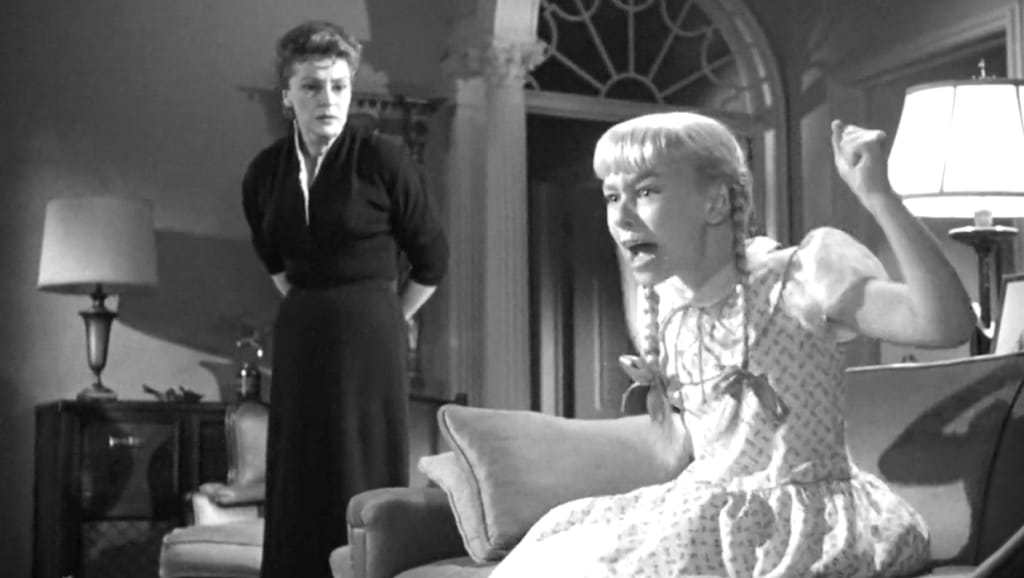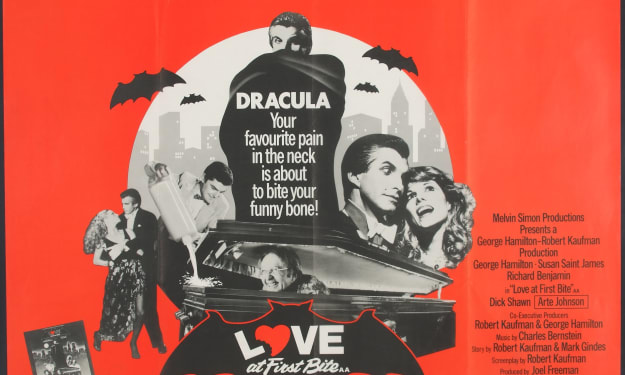
If, as Hillary Clinton once observed, it "takes a village to raise a child," then it must take an Act of God, in the form of a well-timed lightning bolt, to kill one.
Such is the denouement to The Bad Seed, a movie I watched one morning because a dream image of critic Rex Reed told me to get up and do so. I assume he meant I should review it as well. So here goes.
(Incidentally, Rex and I seemed to be crouched at the doorway of some piss-poor hotel just off a freeway in a city that might have been Los Angeles. All those speeding cars, no color on their rusted backsides, headed to ward the Hollywood of their hopes and dreams. Or maybe just to the nearest Taco Bell. Maybe to use the Mens' Room. Whatever.)
So Christine (Nancy Kelly) and her staunch 1950s TV family of an adorable daughter (Patty McCormack) and handsome, Washington-bound military professional husband (William Hopper) live in a house perched on the teetering edge of Eisenhower-Era perfection. White picket fences and green lawns, and gorgeous women and men that wear tweeds and smoke pipes and make their living writing true crime stories. There's a Large Marge neighbor or aunt (Evelyn Varden) or something who is an aficionado of psychoanalysis, who "once met THE Sigmund Freud," which nobody believes (that she met him; but, also, I suppose not a terrible lot of people believe in Freud anymore either.)
These polite, intellectual, affluent, patriotic ALL AMERICAN bourgeois meet for dinner and drinks and have soirees where they discuss murder. What else? One of them is some great writer of crime stories, a tweedy fellow who puffs a pipe.
Darling adorable wunderkind Rhoda plays (or rather fumbles) her way through the same interminable classical piano piece, giving the viewer a foretaste of the counterpoint of her later-to-be-discovered psychopathic Brainscape.
Rhoda is an adorable pigtailed little cutie in a Miss Muffet dress that looks as if she would be a shoo-in to star in a production (either stage or cinematic) of Alice in Wonderland. Unfortunately, deep beneath the bland exterior of polite, if somewhat spoiled curtsying sweetness, lurks a selfish, amoral, sociopathic monster. She loses a penmanship prize, a medal, to a boy named Deigle, and herein is where the fun begins.
Deigle ends up murdered while on a school outing. He falls from a pier. Loses that school medal. But to whom? Strange markings scar his little dead visage. The cops already know NONE OF THIS WAS AN ACCIDENT.
As if to bespeak the truth of class, or maybe completely unintentionally, the filmmakers expose the ugly underside of the neighborhood in the character of Leroy (Henry Jones), who is a very dirty, shabbily-dressed handyman, gardener, Jack-of-All-Trades-type. He has a kind of slithery, slimy, ant-charm, with his thin, unshaven face and generally unhealthy, dirty mien. He's a caricature of "Po' White Trash," just as offensive, in a way as Step N' Fetchit or some other stereotype. Here though, his presence as an outsider observer speaks volumes about the hypocritical underbelly of polite society. He sees little Rhoda, right off the bat, for what she is.
Leroy is almost canned by the aunt, matron, landlady, or whatever she is. But she insists, to his face, that she keeps him purely because she feels sorry for him. He's an unkempt, ugly, dark reminder of the lower strata; it's as if he's the one miserable blackhead in their otherwise unblemished, pristine, and thoroughly bourgeois world.
However, Leroy SEES, and he can see through Rhoda fairly easily. A man kicked around by the vicissitudes of fate cannot be easily fooled, and so he seems to wait in the wings, to crouch, like a brooding, toothsome white trash alley cat, to pounce upon the hypocrisy and blindness of those around him.
Mrs. Deigle (Eileen Heckart), a slightly more elevated victim of the class structure (which is what The Bad Seed is all about), busts in drunkenly, with her nebbish, mustachioed, long-suffering hubby in tow, and accuses both Christine and Rhoda's teacher of hiding the facts in the case of her boy's untimely and mysterious "accidental death." Rhoda's teacher intimates that, curiously, Rhoda won't be welcome back at her exclusive little school NEXT year (she is revealed to have tried to wrest the penmanship medal away from the Deigle boy just before he met his untimely end). Curiouser and curiouser for the little piano-plunking stand-in for Alice (in Wonderland, that is).
Cut to the chase. Christine finds the medal in Rhoda's possession. She quickly and adroitly puts two and two together and realizes her darling daughter is a COLD BLOODED PSYCHOPATH. She ditches the medal in the same lake in which the previous owner was drowned, at the edge of the pier; she discovers the shoes, the ballerina or tap slipper or whatever that Rhoda used to bash in the little Deigle boy's face before consigning him to a watery grave. She burns them. (I think. It's been a few days since I watched this picture, but the plot point does come up again.)
Leroy foolishly confronts little Rhoda, letting her know that he knows just what she is. He may also claim to have the aforementioned shoes. Rhoda sets his bed on fire, and he barely escapes the blaze in his basement room. He dies anyway. Rhoda's victim number two, at least as far as this picture (she is later revealed to have offed an old woman, off camera).
Christine feeds Rhoda a handful of "vitamins" (sleeping pills) and then tries to blow her brains out. She ends up in a coma, and Rhoda survives. Earlier, the ugly secret of the "bad seed" gene is revealed by Christine's father, who reveals that he isn't, of course, her biological father, but that she is the offspring of a notorious serial killer. The evil skipped a generation, manifesting in the maniacal Rhoda, the piano-plunker who continually fills the house with the same ineptly-played classical number, her psychopathic soundtrack.
Christine's hubby returns from Washington or the Pentagon or wherever. Mrs. Deigle busts in again, still drunk, still ranting about not being "quite up to snuff" in the class hierarchy, but having figured out, sure enough, what happened to her son and who is most likely responsible. I could add more, but the final scene is quite enough.
Psychotic Alice, sweet Alice, in the middle of a rainstorm, wearing an adorable little yellow slicker, as if guided by zombie voices, or some unknown power of EVIL, walks unfazed through the rain and darkness to the edge of the pier where she killed her classmate. She attempts to fish the damned cheap little penmanship medal out of the water. It, or rather, what it represents (it should have rightfully been given to HER, after all), is more important to her than standing on the edge of a soaking pier in the rain, making a fruitless search.
Suddenly, the hand of GOD himself, in the form of a lightning bolt, intervenes, plunging the demon seed into the murky depth of the river, as a tree falls over and the credits roll. The end?
No.
But, what is the film trying to tell us? That perfection exists as an illusion, a mirage? That the issues of class and privilege will always exist below the surface of even the banalest and pristine of suburban exteriors? (That, as in the works of Frank Norris and the Naturalists, a person CAN NOT, ultimately, escape that which they innately are?) Anyone that follows the endless glaring, and sensational news and crime headlines already know that "things fall apart, the center cannot hold." They already realize that the surfaces of the world are riddled with the bullet holes of hypocrisy, and that evil, or what we so define as evil, lurks like a seething basilisk at the heart of a small child. It can transmute itself like a virus across the face of generations.
Or perhaps Rhoda, prefiguring later literary creations such as American Psycho's Patrick Bateman, is simply the somewhat sobering side effect of bourgeois materialism and what could be described, in the era, as a quest for the American "Ideal" (anyone that deviated from this, as in the case of the drunken Mrs. Deigle, was going to never be accepted into such a milieu, not fully, and she knew it). Rhoda is the perfect, angel-faced little android, a killing machine of rare beauty, spoiled and obsessed with the perfect outward manifestations of material perfection. But, as it is said in the film American Psycho, "But INSIDE...INSIDE..."
She simply...is not...there...
One scene, that has always stood out in memory from when I first saw the film, decades ago, has little Rhoda confessing quite calmly to her mother her crimes, why she did them...when she speaks of her motivations, her "why", each time, she explodes, becoming not a calm, sweet little thing anymore, but an enraged child, almost one we pity. She acted one almost feels, not so much out of malice, but simply because such situations as NOT being awarded the medal offended her sense of propriety; they did not "compute." It is a chilling performance for a child actress, and one I shall scarce ever be able to forget.
Christine Penmark: All right. All right now, we're gonna... We're gonna start at the beginning and you're gonna tell me the truth. I know you killed him, so there's no sense lying. Rhoda, I want you to tell me the truth!
Rhoda: I can't tell you, mother! I want you to...
Christine Penmark: I'm waiting for your *answer*.
Rhoda: He wouldn't give me the medal like I told him to, that's all. So then he ran away from me and hid on the wharf. But I found him there and I told him I'd hit him with my shoe if he didn't give me the medal! But he shook his head and said no. So I hit him the first time. Then he took off the medal and gave it to me.
Christine Penmark: And then what happened?
Rhoda: Tried to run away from me. So I hit him with my shoe again! But he kept on crying and making a noise and I was afraid somebody would hear him... So I kept on hitting him, mother! I hit him harder that time and he fell in the water.
But what is the message here? Is evil "born," made through inattention and indulgence, or just allowed to breed, like the "dragons in their pleasant places," even in the midst of a Leave it to Beaver fairy tale of American Exceptionalism? I don't know, I must confess. I'm uncertain, at this point, how Rex Reed feels about it, either.
Based on the play by Maxwell Anderson, which, in turn, was based on the 1954 novel by William March. Screenplay adaptation by John Lee Mahin. It was directed by Mervyn LeRoy.
About the Creator
Tom Baker
Author of Haunted Indianapolis, Indiana Ghost Folklore, Midwest Maniacs, Midwest UFOs and Beyond, Scary Urban Legends, 50 Famous Fables and Folk Tales, and Notorious Crimes of the Upper Midwest.: http://tombakerbooks.weebly.com






Comments
There are no comments for this story
Be the first to respond and start the conversation.